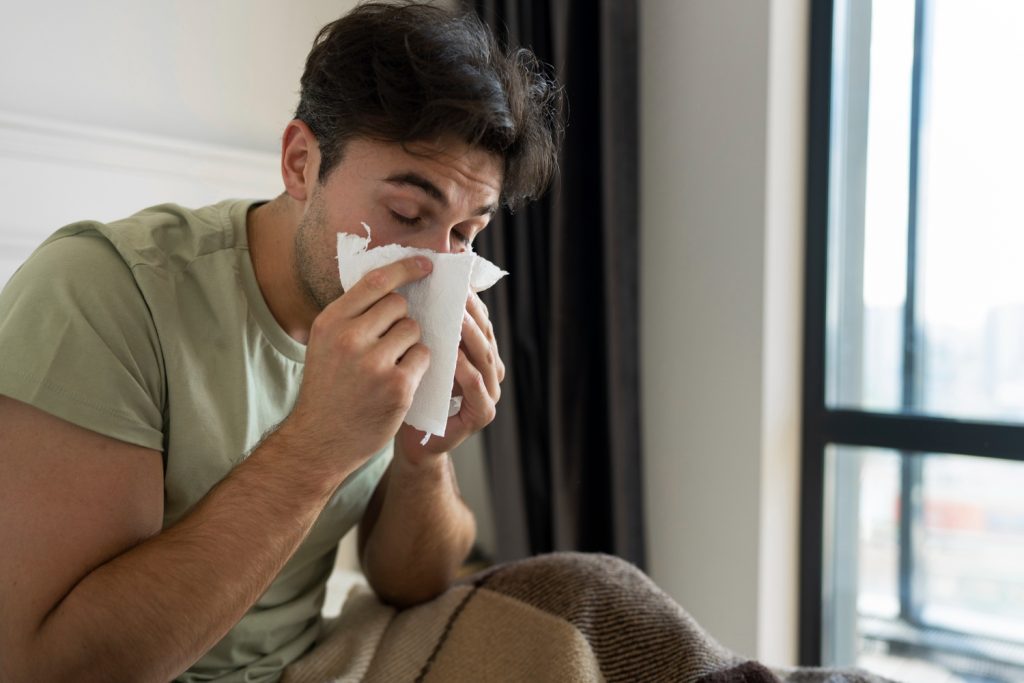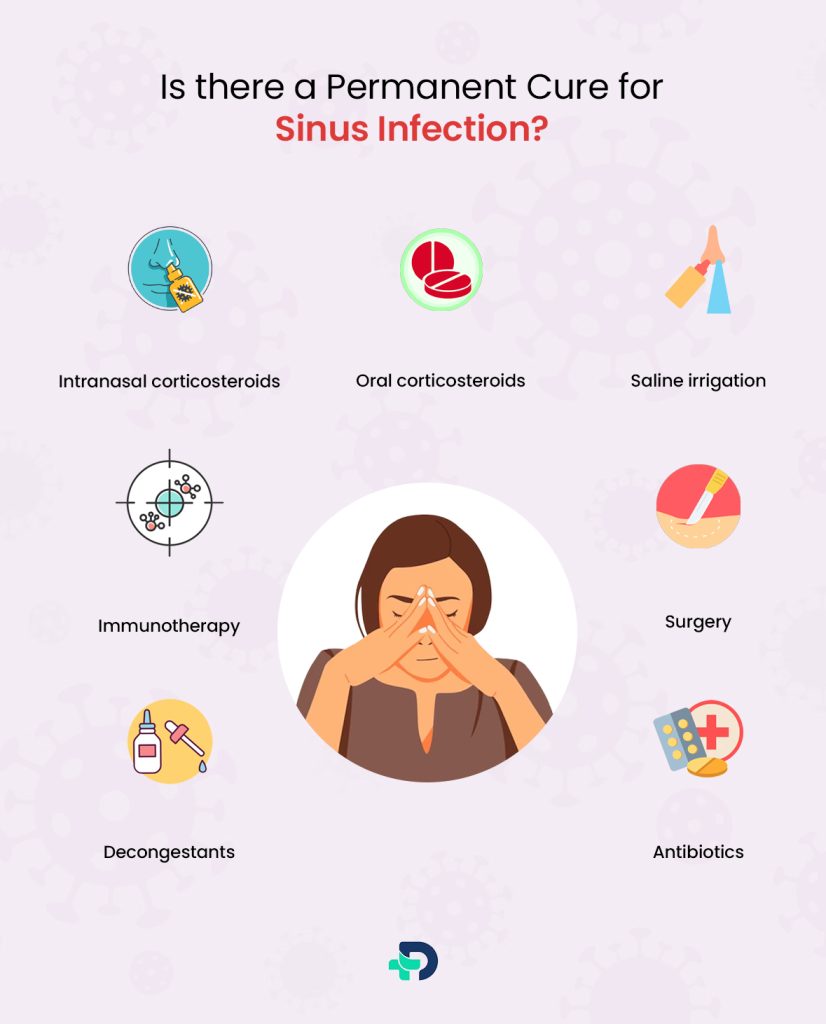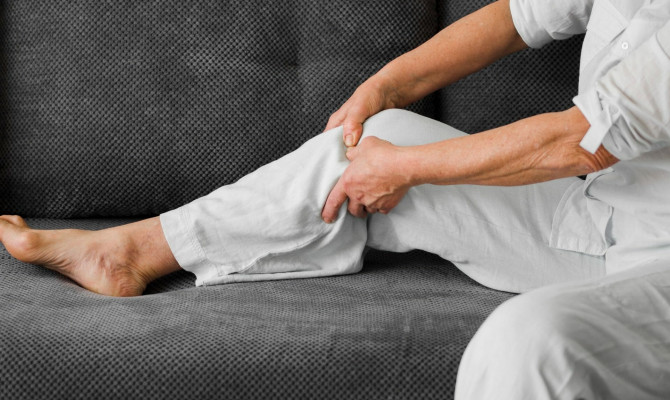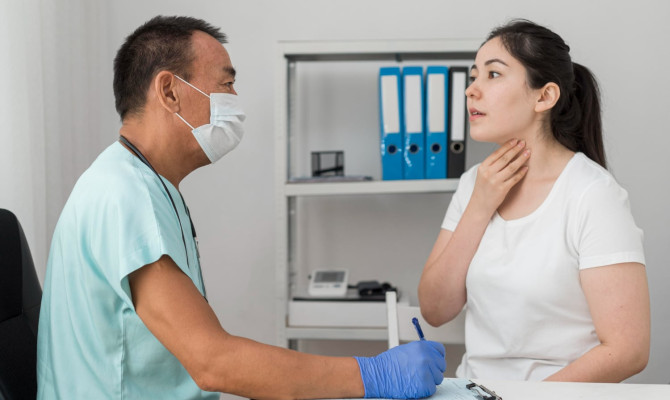Does Steroid Shot For Sinus Infection Work?

- Sinusitis
- 04 Oct 2023
Overview
Steroid Shot For Sinus Infection
Sinus infection, also called sinusitis is the swelling and pain in the sinus’s tissue lining. Sinuses are the four paired air-filled spaces at the back of forehead and nose that produce mucus from the nasal passage. The sinus’s mucus assists in keeping the nose dirt-free. Any sinus infection due to viruses, fungi, bacteria or other sensitivity obstructs the sinuses from fluid discharge through nose leading to fluid congestion within the air spaces. The fluid force in the sinuses eventually leads to pain and swelling. Doctors generally advise steroids viz; cortisone and prednisone to decrease the sinus pain and puffiness in patients. Some people utilize glucosteroid nasal spray to tackle the pain and swelling caused by sensitivity or sinus infection. The physician prescribes steroid injection only if other treatments for sinusitis fail to give the desired results in patients or if the infection continues for more than three months. However, physicians also provide steroid injections to manage other health issues viz; joint and muscle aches. Sinusitis is an agonizing occurrence in one’s life. Individuals with persistent sinusitis might suffer from intolerable circumstances. People believe steroid injection to tackle such painful situations rapidly and efficiently 1 Overview | Researched based study from National Institutes of Health .

The article will describe what steroid injections do in the body and whether the shots work, as most people believe. Moreover, it will also clarify specific queries people generally have regarding steroid shots and sinus infections.
Types
Types of Steroid Injections
Physicians can deliver steroid injections to patients in several ways to treat chronic pain and swelling in different body parts, which might include-
- Intramuscular shot (into the muscles)
- Intravenous shot (into the veins)
- Intra-articular shot (into the joint)
- Epidural shot (into the spine)
Some examples of common steroid injections that doctors prescribe are listed below-
- Triamcinolone (for gout and other skin diseases)
- Hydrocortisone (for arthritis, asthma, kidney problems)
- Methylprednisolone (for multiple sclerosis)
- Dexamethasone (for severe covid-19) 2 Types | Researched based study from National Institutes of Health .
Conditions treated with Steroid injection
Doctors might prescribe steroid injections to treat the following conditions-
- Rheumatic arthritis (autoimmune disease)
- Tendinitis (fibrous cord inflammation that attaches muscle to bone)
- Bursitis (swelling and pain of the fluid-filled sac called bursa sac that protects the tendons and bones)
- Asthma (inflammation of airways to the lungs)
- Inflamed joints and tendons
- Allergic rhinitis (nose inflammation due to dust and pollen)
- Multiple sclerosis (disease of the spinal cord and brain)
- Cancer (uncontrolled cell growth) 3 Types | Researched based study from JAMA Network .
Benefits
Benefits of Steroid Shots
- Corticosteroids functions to ease the pain and engorgement in the sinuses.
- It enables the general free flow of mucus into the abdominal cavity and decreases the force in the sinuses thereby diminishing the sinus pain and discomfort.
- Steroid shots direct the steroids straightaway into the swollen sinus tissue.
- Hence, the procedure relieves sinusitis symptoms more accurately than other treatments, such as oral steroids and nasal spray.
- Yet, recurrent steroid shots might cause specific health issues.
- Hence, the doctors generally recommend steroid injections only for severe sinusitis cases that do not respond to earlier treatments or for extended sinus infections that do not goes off quickly 4 Benefits | Researched based study from National Institutes of Health .
Administration
Administration of Steroid Shot
- During the injection procedure, the ENT (ear, nose, and throat) professional will first administer an anesthetic substance into the nose to lessen the pain during the treatment.
- Then the doctor will inject the steroid into the nostrils through a fine needle. It is a rapid outpatient procedure needing no hospital stay post-treatment.
- The physician might also advise other medications to ward off infections 5 Administration | Researched based study from National Institutes of Health .
Effectiveness
Effectiveness of Steroid Shot
- The steroid shot initiate functioning rapidly after administration and usually, the effect remains for an extended period—Doctors advice patients to take another shot only if the infection reappears. Most people typically get sinus reinfection after three months to one year following the first shot.
- Yet, many people even recover from the first shot and rarely need to take the second injection 6 Effectiveness | Researched based study from National Institutes of Health .
Cure

Is there a Permanent Cure for Sinus Infection?
Numerous treatments can cure sinusitis permanently.
Depending on the cause of the illness, doctors might recommend the following therapies-
Oral corticosteroids
- They are oral pills that function like intranasal steroids. Doctors recommend oral corticosteroids when oral antibiotics don’t respond.
Intranasal corticosteroids
- Intranasal corticosteroids viz; Nasonex are drugs that decrease the swelling in the nasal route for free flowing of the nose’s mucus and easy breathing.
Saline irrigation
- Saline irrigation uses nasal saline sprays to make the nasal mucus less dense, so the fluid comes from the nose more easily.
Decongestants
- Decongestants are drugs sold either as oral medicines or nasal sprays. It relieves sinus congestion.
- However, people must not use decongestants for extended periods as they might cause adverse effects.
Antibiotics
- Antibiotics are drugs that destroy or inhibit bacterial growth
- Doctors will order specific tests to determine the pathogen causing sinusitis.
- The doctor might prescribe antibiotics if the cause of sinusitis is bacterial infection.
Immunotherapy
- Immunotherapy is a treatment that utilizes portions of the patient’s immune cells to prevent illness. Some people have persistent sinusitis due to immunodeficiency conditions viz; IgA deficiency.
- The physician might then prescribe immunotherapy treatments to improve the body’s ability to combat diseases.
Surgery (in case of chronic sinusitis)
- When all medicinal efforts to treat sinusitis fail, doctors often recommend surgery to manage the disease.
- The surgeon widens the sinus cavity during the surgical technique, enabling mucus drainage and easier breathing.
- However, the patient still needs drugs post-surgery to prevent persistent sinusitis from reappearing.
- Sinusitis patients whose other medical treatments did not respond find comfort in surgery 9 Permanent Cure | Researched based study from National Institutes of Health .
Some home remedies to treat chronic sinus infection
- Drinking an adequate amount of water to thin out the mucus clogged in the sinus cavity
- Using warm compresses might unlock the sinus passages and might ease difficult breathing
- Taking plenty of rest to give the body enough time to heal faster 10 Home Remedy | Researched based study from National Institutes of Health .
Side Effects
What are the Side Effects of Steroids?
People can get momentary adverse effects from the steroid shots.
Some of the common side effects of steroid shots are listed below-
- Pain in the injected site
- Difficult sleeping
- Face reddening
- Increased blood sugar
Rare adverse effects
- Bleeding in the injected site
- Injected site infection
- Extended pain
- Itching
- Urticaria
- Swelling in the face, lips and mouth
- Trouble breathing
Serious side effects (due to recurrent steroid shots)
- Permanent bone or cartilage damage
To avoid serious consequences, physicians usually do not suggest more than four steroid injections in 12 months for any health issues 7 Adverse Effects | Researched based study from National Institutes of Health .
FAQs
Steroid Shot for Sinus Infection: Frequently Asked Questions
Q. Will a steroid shot help with a sinus infection?
- Yes, steroid shots do help with sinus infections. However, it is one of the treatments doctors prescribe for severe or chronic sinusitis when other treatment options do not respond.
- In several individuals, they get relief from pain and swelling within a day.
The relief after taking steroid shots might differ from person to person. Most individuals get relief within weeks while others might need frequent injections to get the same effect.
- Although a steroid shot eases sinusitis symptoms, one must never forget that it is only one of the options to manage the condition and not a cure. Research studies have shown that steroid shots can control symptoms, viz. facial pain, pressure, and nose blockage.
- Doctors might also give additional treatments, viz; nasal corticosteroids and antibiotics, in some patients to obtain total relief from sinusitis 1 FAQs | Researched based study from National Institutes of Health.
Q. How many steroid shots can you get for sinus infection?
- Before taking the injection, one must always inform the physician regarding earlier steroid shots for the condition.
- An individual must maintain 120 days before taking the second dose of steroid injection.
- Physicians usually only suggest up to four shots in the same site within one year.
Q. Why do steroids help with sinusitis?
- Steroids are a helpful drug that can handle pain and swelling.
- Pharmaceutical companies manufacture steroids identical to the body’s natural hormone, cortisol. Cortisol is a chemical messenger produced by the adrenal gland. Cortisol hampers the body by producing substances that enhances swelling and pain.
- The steroid drugs functions alike and inhibits or prevents the immune system in producing inflammation triggering substances. So, steroids help in treating sinusitis 11 FAQs | Researched based study from National Institutes of Health .
Q. Is a steroid/ antibiotic good for sinus infections?
- The sinus infection treatment depends on the infection type and the source causing the swelling and pain.
- People might need antibiotics when the inflammation is due to bacterial infection.
- But sometimes the infection might be due to viral infection, in that case antibiotics might not relief the symptoms and consuming it might cause surplus side effects.
- Physicians only recommend antibiotics when they suspect a bacterial infection.
- However, one should never forget that bacterial sinusitis can resolve within 10 to 14 days, even without treatment. However, people can alleviate the bacterial sinusitis symptoms at those times by taking over the counter drugs, nasal decongestants, or inhaling steam 12 FAQs | Researched based study from Centers for Disease Control and Prevention .
Takeaway
Steroid Shot for Sinus Infection – Takeaway
For sinusitis, steroid injections are usually not recommended, but the physician might suggest one if other treatments fail to give appropriate results. Individuals with recurrent sinusitis after three months and if the nasal sprays and antibiotics do not respond a steroid injection might ease the situation. However, the procedure delivers more corticosteroids than other techniques and might have further adverse effects.
Any feedback on this article?
 This Articles content was accurate
This Articles content was accurate Very Informative Article
Very Informative Article I have a question or a comment
I have a question or a comment
 This article contains inaccurate content
This article contains inaccurate content This article was not helpful
This article was not helpful I have a question or a comment
I have a question or a comment
We appreciate your helpful feedback!
Checkout our social pages
References
-
National Institutes of Health
Overview | FAQs
-
National Institutes of Health
Types
-
JAMA Network
Types
-
National Institutes of Health
Benefits
-
National Institutes of Health
Administration
-
National Institutes of Health
Effectiveness
-
National Institutes of Health
Adverse Effects
-
National Institutes of Health
Oral Steroids
-
National Institutes of Health
Permanent Cure
-
National Institutes of Health
Home remedy
-
National Institutes of Health
FAQs
-
Centers for Disease Control and Prevention
FAQs





































